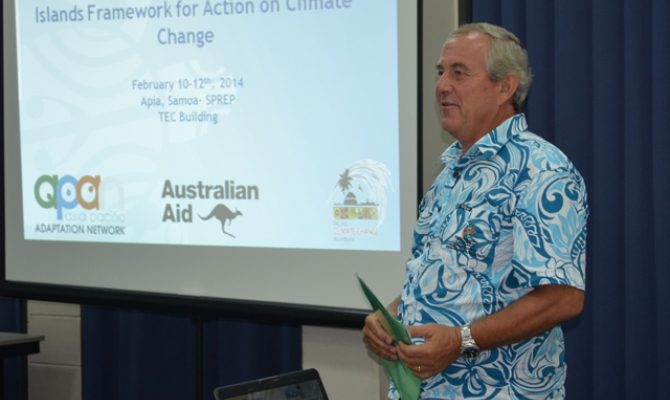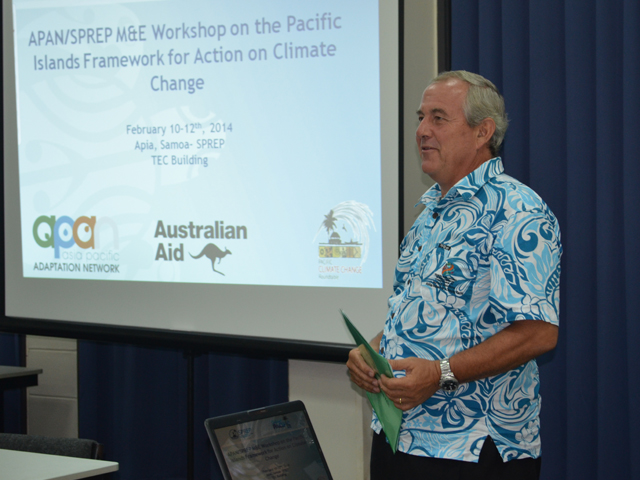
Climate Change Resilience
A stocktake on how well we 'walk the talk' is a key part of the Pacific Islands Framework for Action on Climate Change (PIFACC) - the Pacific island region's 10-year strategy to address the climate change issues faced by our islands.
Endorsed in 2005 by Pacific Leaders, the vision of this framework is 'Pacific Island people, their livelihoods and environment resilient to the risks and impacts of climate change.'
The Secretariat of the Pacific Regional Environment Programme (SPREP) is hosting a three-day workshop this week in Apia, Samoa, to assist in the monitoring and evaluation of targets committed to by countries under the regional climate change framework.

"An important element of our work on PIFACC is in monitoring and evaluation. Together we need to check if we are doing what we said we'll do, and also achieving what this framework set out to do," said Mr. David Sheppard, Director-General of SPREP, at the opening of the workshop.
"This is largely done through the Pacific Climate Change Roundtable, which brings together countries, stakeholders, academia and partner agencies working together on climate change every two years, and also through the respective working groups of this Roundtable. This workshop is an opportunity for countries to become familiar with some monitoring and evaluation tools developed by SPREP and to become confident in using these."
The workshop is being facilitated by Dr. Netatua Pelesikoti (Director of SPREP's Climate Change Division), who has reminded participants that while we are reflecting on the climate change accomplishments of individual countries, we must remember that climate change is everyone's business.
"This workshop is not just about reviewing climate change programmes undertaken by SPREP," said Dr Pelesikoti. "There is now a wealth of partner agencies working together to address this very important issue and it is through our coordinated contribution that we will see success".

The three-day workshop will help countries review progress made at the national level in meeting the themes of the PIFACC, finalise climate change country profiles and share and document lessons learnt in implementing the Framework since 2005.
This will also be an opportunity to help strengthen understanding of the new incoming strategy which will further integrate disaster risk management and climate change.
Half a day will be dedicated to fostering awareness on the Asia Pacific Adaptation Network (APAN) and its role in supporting adaptation work in the Pacific.
As an official regional node of APAN, SPREP appreciates the support provided by APAN particularly in capacity building and networking activities related to adapting to climate change. This is the third workshop of its kind that APAN has supported in the Pacific since SPREP became an official node in 2011.
The workshop is an activity funded under a joint partnership between SPREP and APAN with additional funding support provided by the Government of Australia through its International Climate Change Adaptation Initiative.
The workshop is being held at the SPREP campus from 10 to 12 February with participants from American Samoa, Cook Islands, Fiji, Kiribati, Niue, Palau, Republic of the Marshall Islands, Solomon Islands, Tonga, Tuvalu and Vanuatu.
Endorsed in 2005 by Pacific Leaders, the vision of this framework is 'Pacific Island people, their livelihoods and environment resilient to the risks and impacts of climate change.'
The Secretariat of the Pacific Regional Environment Programme (SPREP) is hosting a three-day workshop this week in Apia, Samoa, to assist in the monitoring and evaluation of targets committed to by countries under the regional climate change framework.

"An important element of our work on PIFACC is in monitoring and evaluation. Together we need to check if we are doing what we said we'll do, and also achieving what this framework set out to do," said Mr. David Sheppard, Director-General of SPREP, at the opening of the workshop.
"This is largely done through the Pacific Climate Change Roundtable, which brings together countries, stakeholders, academia and partner agencies working together on climate change every two years, and also through the respective working groups of this Roundtable. This workshop is an opportunity for countries to become familiar with some monitoring and evaluation tools developed by SPREP and to become confident in using these."
The workshop is being facilitated by Dr. Netatua Pelesikoti (Director of SPREP's Climate Change Division), who has reminded participants that while we are reflecting on the climate change accomplishments of individual countries, we must remember that climate change is everyone's business.
"This workshop is not just about reviewing climate change programmes undertaken by SPREP," said Dr Pelesikoti. "There is now a wealth of partner agencies working together to address this very important issue and it is through our coordinated contribution that we will see success".

The three-day workshop will help countries review progress made at the national level in meeting the themes of the PIFACC, finalise climate change country profiles and share and document lessons learnt in implementing the Framework since 2005.
This will also be an opportunity to help strengthen understanding of the new incoming strategy which will further integrate disaster risk management and climate change.
Half a day will be dedicated to fostering awareness on the Asia Pacific Adaptation Network (APAN) and its role in supporting adaptation work in the Pacific.
As an official regional node of APAN, SPREP appreciates the support provided by APAN particularly in capacity building and networking activities related to adapting to climate change. This is the third workshop of its kind that APAN has supported in the Pacific since SPREP became an official node in 2011.
The workshop is an activity funded under a joint partnership between SPREP and APAN with additional funding support provided by the Government of Australia through its International Climate Change Adaptation Initiative.
The workshop is being held at the SPREP campus from 10 to 12 February with participants from American Samoa, Cook Islands, Fiji, Kiribati, Niue, Palau, Republic of the Marshall Islands, Solomon Islands, Tonga, Tuvalu and Vanuatu.